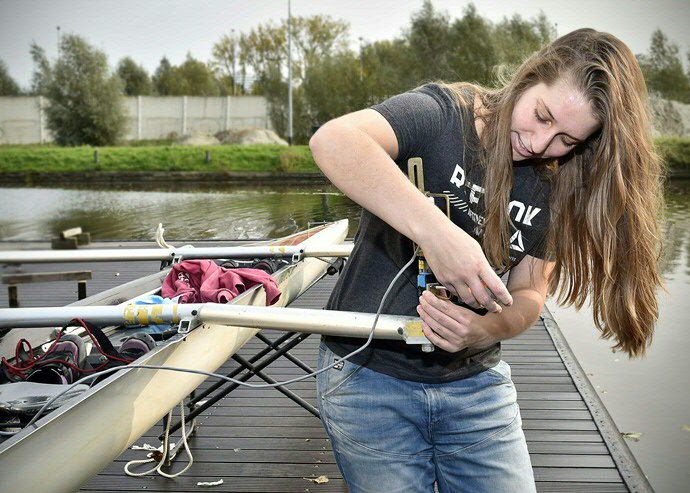Alternating rowing strokes can lead to faster races

All rowing boats experience fluctuations in velocity during a race. This is because the speed of the boat decreases considerably between two strokes. These fluctuations can be limited by having rowers take turns to take a stroke instead of rowing in sync. This can potentially lead to faster race times, since rowing is most efficient when the boat travels at the most constant speed possible. This is the conclusion reached by Laura Cuijpers of the UMCG in her PhD thesis. Cuijpers’ research shows that crews are actually able to row using this method in practice and that it leads to fewer velocity fluctuations. The results of her research are a promising indication that crews may benefit from rowing in this way. Cuijpers was awarded a PhD by the University of Groningen on 9 September.
Rowing is a great example of teamwork, synchronization and cooperation. It is fascinating to see how, for example, a crew of eight rowers, performing to the maximum of their ability, move as one in perfect synchronization. As a spectator, you see one crew – one boat – instead of eight individual rowers. Normally, rowers strive for perfect synchronization. In theory, crews should be able to achieve faster times through antiphase rowing, whereby rowers take turns to take a stroke. This is because this technique reduces fluctuations and drops in boat speed between two strokes.
Research on the rowing pattern
In her research, Cuijpers investigated whether this is indeed the case and whether crews can actually perform the unconventional pattern in practice. She conducted her research both in the lab and on the water. In the lab, she used ergometers connected by slides to simulate the movements of a ‘boat’ on water; on the water, she measured the crews using a self-developed measuring system.
Crews can actually row in antiphase coordination
In her research, Cuijpers shows that rowers are indeed able to row in antiphase coordination, even when attempting it for the first time. However, crew coordination was less stable than when rowing in sync, which is of course second nature to them and which they have practiced a lot. The crews were able to perform both types of rowing more stably at higher stroke frequencies than at lower stroke frequencies; this is particularly important since crews row at higher stroke frequencies during races.
The clap skate of rowing?
Cuijpers shows that antiphase rowing does indeed lead to fewer fluctuations in velocity. However, it hasn’t yet resulted in faster times in races; one of crews rowed at WC-level before was only four seconds slower in their first attempt at antiphase rowing than when they rowed in sync. According to Cuijpers, the results of her research show a promising first indication of the potential benefits of out-of-phase rowing. ‘This might turn out to be the clap skate of rowing.’ She would like to see more studies on the advantages of rowing in antiphase coordination. Cuijpers: ‘This isn’t really about whether rowing in this way turns out to be quicker in the end. Rowing is a great sport for studying human cooperation – regardless of whether that’s in sync or in a way in which the individual crew members can complement each other, such as in antiphase rowing.’
Curriculum vitae
Laura Cuijpers (1991, born in Dordrecht) studied Human Movement Sciences at the University of Groningen, partly inspired by her experiences as a competitive rower. Her thesis is entitled ‘Coordination dynamics in crew rowing’. After her PhD, she will continue to work as a lecturer and researcher in the Human Movement Sciences department at the UMCG.
More information
More news
-
17 November 2025
Artificial intelligence in healthcare
-
04 November 2025
AI Factory in Groningen advances digital sovereignty
-
03 November 2025
Menopause in perspective: How the media influences our perception
